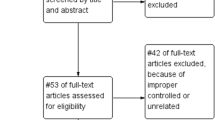Abstract
Objective
To evaluate the efficacy and safety of topical delivery of modified Da-Cheng- Qi Decoction (加味大承气汤, MDCQD) by low-frequency ultrasound sonophoresis (LFUS) in patients with refractory metastatic malignant bowel obstruction (MBO) using an objective performance criteria (OPC) design.
Methods
Fifty patients with refractory metastatic MBO were enrolled in this open-label single-arm clinical trial. Alongside fasting, gastrointestinal decompression, glycerol enema, intravenous nutrition and antisecretory therapy, a 50 g dose of MDCQD (prepared as a hydrogel) was applied through topical delivery at the site of abodminal pain or Tianshu (S 25) using LFUS for 30 min, twice daily for 5 consecutive days. The overall outcome was the remission of intestinal obstruction, and improvement on abdominal pain, abdominal distention, nausea and vomiting scores. Indicators of safety evaluation included liver and renal function as well as blood coagulation indicators.
Results
Among 50 patients, 5 patients (10%) showed complete remission of intestinal obstruction and 21 patients (42%) showed improvement of intestinal obstruction. The overall remission rate of bowel obstruction was 52%. The results of the symptom score, based on the severity and frequency of the episode, are as follows: 26 patients (52%) showed improvment on symptom scores, 20 patients (40%) did not respond to treatment, and 4 patients (8%) discontinued treatment due to intolerance. No serious adverse effects or abnormal changes on liver and renal function or blood coagulation were observed.
Conclusion
Topical delivery of MDCQD at 100 g/day using LFUS can improve the treatment response in patients with refractory metastatic MBO.
Similar content being viewed by others
References
Tuca A, Guell E, Martinez-Losada E, Codorniu N. Malignant bowel obstruction in advanced cancer patients: epidemiology, management, and factors influencing spontaneous resolution. Cancer Manag Res 2012;4:159–169.
Idelevich E, Kashtan H, Mavor E, Brenner B. Small bowel obstruction caused by secondary tumors. Surg Oncol 2006;15:29–32.
Chi DS, Phaeton R, Miner TJ, Kardos SV, Diaz JP, Leitao MM, Jr., et al.. Oncologist 2009;14:835–839.
Alese OB, Kim S, Chen Z, Owonikoko TK, El-Rayes BF. Management patterns and predictors of mortality among US patients with cancer hospitalized for malignant bowel obstruction. Cancer 2015;121:1772–1778.
Wancata LM, Abdelsattar ZM, Suwanabol PA, Campbell DA, Jr., Hendren S. Outcomes after surgery for benign and malignant small bowel obstruction. J Gastrointest Surg 2017;21:363–371.
Paul Olson TJ, Pinkerton C, Brasel KJ, Schwarze ML. Palliative surgery for malignant bowel obstruction from carcinomatosis: a systematic review. JAMA Surg 2014;149:383–392.
Henry JC, Pouly S, Sullivan R, Sharif S, Klemanski D, Abdel-Misih S, et al. A scoring system for the prognosis and treatment of malignant bowel obstruction. Surgery 2012;152:747–756.
Hayashi S, Takayama T, Masuda H, Kochi M, Ishii Y, Matsuda M, et al. Bioresorbable membrane to reduce postoperative small bowel obstruction in patients with gastric cancer: a randomized clinical trial. Ann Surg 2008;247:766–770.
Karoui M, Charachon A, Delbaldo C, Loriau J, Laurent A, Sobhani I, et al. Stents for palliation of obstructive metastatic colon cancer: impact on management and chemotherapy administration. Arch Surg 2007;142:619–623; discussion 623.
Liu Y, Jiang TH, Chen Y. Traditional Chinese medicine in treatment of malignant obstruction of combined effect in choice of strategy. J Liaoning Univer Tradit Chin Med (Chin) 2014;16:246–248.
Yang B, Xu FY, Sun HJ, Zou Z, Shi XY, Ling CQ, et al. Da-cheng-qi Decoction, a traditional Chinese herbal formula, for intestinal obstruction: systematic review and meta-analysis. Afr J Tradit Complement Altern Med 2014;11:101–119.
Yan GH, Zheng LJ, Wang H. Topical application of Da-Cheng-Qi Decoction for prevention and treatment of early intestinal obstruction. Zhejiang J Integr Tradit Chin Western Med (Chin) 2014;24:511–512.
Byl NN. The use of ultrasound as an enhancer for transcutaneous drug delivery: phonophoresis. Phys Ther 1995;75:539–553.
Polat BE, Blankschtein D, Langer R. Low-frequency sonophoresis: application to the transdermal delivery of macromolecules and hydrophilic drugs. Expert Opin Drug Deliv 2010;7:1415–1432.
Yu SY, Wang JJ, Wang JW, Shi YK, Jiang ZW, Li J, et al. Expert consensus on treatment of intestinal obstruction in advanced cancer patients. Chin J Oncol (Chin) 2007;29:637–640.
Karnofsky Performance Score. In: Schwab M (ed) Encyclopedia of cancer. Springer: Berlin, Heidelberg; 2011.
Jackson P, Vigiola Cruz M, Intestinal obstruction: evaluation and management. Am Fam Physic 2018;98:362–367.
Li DX, Yang ZH, Qiu FH, Li GN, Shi ZJ, Yang ZT, et al. Effects of acupuncture combined with fasting surgical nutritional support rehabilitation in perioperative period of colorectal cancer. Guangxi Med J (Chin) 2018;40:872.
Zhong G. Progress in prevention and treatment of malignant intestinal obstruction by traditional Chinese Medicine. Chin J Surgery Integr Tradit West Med (Chin) 2016;22:196–200.
Zhang BG, Liang XX, Liu QF. Modern pharmacodynamics of Da-Cheng-Qi Decoction. Chin Tradit Patent Med (Chin) 2009;31:1427–1430.
Escobar-Chavez JJ, Bonilla-Martinez D, Villegas-Gonzalez MA, Rodriguez-Cruz IM, Dominguez-Delgado CL. The use of sonophoresis in the administration of drugs throughout the skin. J Pharm Sci 2009;12:88–115.
Park D, Park H, Seo J, Lee S. Sonophoresis in transdermal drug delivery. Ultrasonics 2014;54:56–65.
Author information
Authors and Affiliations
Contributions
Tian AP conducted research design and implementation management; Yin YK, Yu L, Yang BY, Li N, LI JY and Bian ZM involved in patient management; Hu SY performed data statistics and analysis; Weng CX contributed to the technical support for low-frequency ultrasound sonophoresis; Feng Li is research consultant.
Corresponding author
Ethics declarations
The authors have declared that there are no conflicts of interest.
Additional information
Supported by the Beijing Hope Run Special Fund of Cancer Foundation of China (No. LC2014B18)
Rights and permissions
About this article
Cite this article
Tian, Ap., Yin, Yk., Yu, L. et al. Topical Delivery of Modified Da-Cheng-Qi Decoction (加味大承气汤) Using Low-Frequency Ultrasound Sonophoresis for Refractory Metastatic Malignant Bowel Obstruction: An Open-Label Single-Arm Clinical Trial. Chin. J. Integr. Med. 26, 382–387 (2020). https://doi.org/10.1007/s11655-019-3041-7
Accepted:
Published:
Issue Date:
DOI: https://doi.org/10.1007/s11655-019-3041-7




